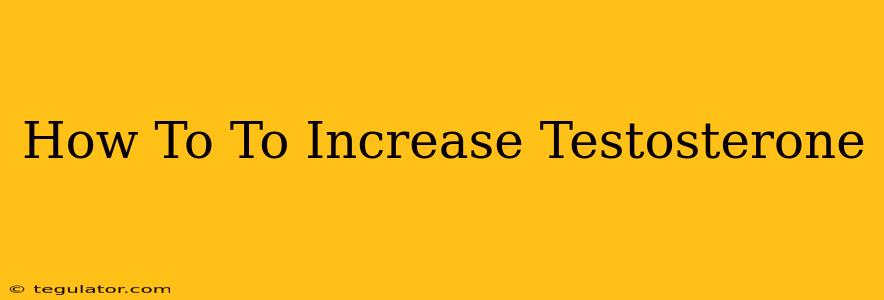Low testosterone can significantly impact your physical and mental well-being. Feeling tired, experiencing low libido, or noticing decreased muscle mass? You might be wondering how to naturally boost your testosterone levels. This comprehensive guide explores effective strategies to increase your testosterone naturally, backed by science and designed to improve your overall health.
Understanding Testosterone & Its Importance
Testosterone is a crucial hormone for men, playing a vital role in:
- Muscle growth and strength: Testosterone stimulates muscle protein synthesis, leading to increased muscle mass and strength.
- Bone density: It contributes significantly to maintaining strong bones and reducing the risk of osteoporosis.
- Libido and sexual function: Testosterone is essential for a healthy sex drive and proper sexual function.
- Energy levels and mood: Adequate testosterone levels are linked to increased energy, improved mood, and reduced symptoms of depression.
- Red blood cell production: Testosterone supports the production of red blood cells, carrying oxygen throughout the body.
Low testosterone, or hypogonadism, can lead to a range of symptoms, impacting your quality of life. Let's explore how to naturally combat this.
Natural Ways to Increase Testosterone
While medical intervention might be necessary in some cases, many lifestyle changes can significantly impact your testosterone levels:
1. Optimize Your Diet
Nutrition plays a crucial role in hormone regulation. Focus on a diet rich in:
- Healthy Fats: Foods like avocados, nuts, seeds, and olive oil provide essential fatty acids that support testosterone production.
- Protein: Lean protein sources, such as chicken, fish, and beans, are essential for muscle building and testosterone synthesis.
- Zinc and Magnesium: These minerals are crucial for testosterone production. Good sources include oysters, red meat, nuts, and seeds.
- Vitamin D: Vitamin D deficiency is linked to low testosterone. Get sufficient sunlight exposure or consider supplementation.
Avoid processed foods, sugary drinks, and excessive alcohol consumption, as they can negatively impact testosterone levels.
2. Exercise Regularly
Resistance training is particularly effective in boosting testosterone. Lifting weights stimulates muscle growth, which in turn, increases testosterone production. Aim for a comprehensive workout routine that includes both resistance training and cardiovascular exercise.
Consistency is key. Regular exercise, combined with a healthy diet, is crucial for optimizing testosterone levels.
3. Get Enough Sleep
Sleep deprivation significantly impacts hormone production, including testosterone. Aim for 7-9 hours of quality sleep each night. Establish a regular sleep schedule, create a relaxing bedtime routine, and ensure your bedroom is dark, quiet, and cool.
4. Manage Stress
Chronic stress elevates cortisol levels, a hormone that can suppress testosterone production. Effective stress management techniques include:
- Yoga and Meditation: These practices can help reduce stress and promote relaxation.
- Spending time in nature: Connecting with nature has been shown to lower stress levels.
- Hobbies and leisure activities: Engage in activities you enjoy to de-stress and improve your overall well-being.
5. Consider Supplements (Consult a Doctor First)
Some supplements, such as D-aspartic acid and fenugreek, have shown promise in increasing testosterone levels. However, it's crucial to consult your doctor before taking any supplements, as they can interact with medications or have potential side effects.
Never self-medicate. Always seek professional guidance to ensure you're taking the right approach.
When to Seek Medical Advice
If you suspect you have low testosterone, it's crucial to consult a doctor. They can conduct tests to determine your levels and recommend appropriate treatment if necessary. Low testosterone can be a symptom of underlying health conditions, so a professional diagnosis is essential.
Don't delay seeking help. Addressing low testosterone early can significantly improve your overall health and quality of life. This guide offers natural strategies, but professional guidance ensures a personalized and effective approach.

